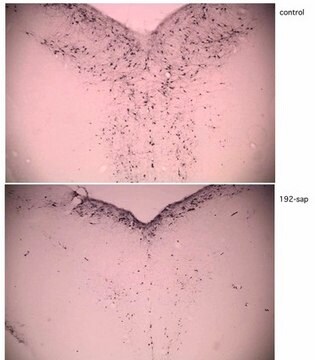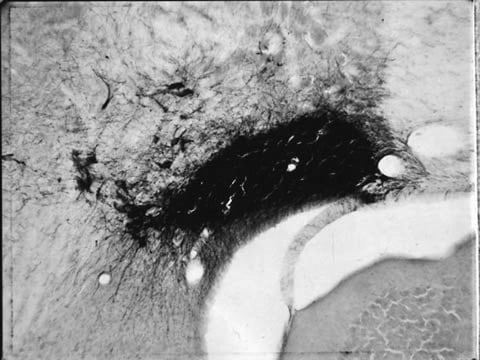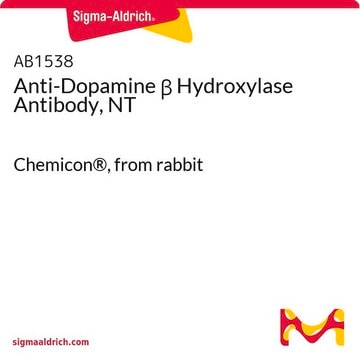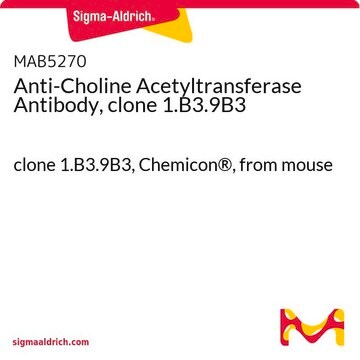MAB394
Anti-Dopamine β Hydroxylase-SAP Antibody, clone 4F10.2
clone 4F10.2, Chemicon®, from mouse
Iniciar sesiónpara Ver la Fijación de precios por contrato y de la organización
About This Item
UNSPSC Code:
12352203
eCl@ss:
32160702
NACRES:
NA.41
Productos recomendados
biological source
mouse
Quality Level
conjugate
saporin
antibody product type
primary antibodies
clone
4F10.2, monoclonal
species reactivity
rat
packaging
antibody small pack of 25 μg
manufacturer/tradename
Chemicon®
technique(s)
immunolesioning: suitable
isotype
IgG1
NCBI accession no.
UniProt accession no.
shipped in
wet ice
target post-translational modification
unmodified
Gene Information
rat ... Dbh(25699)
Specificity
Dopamine b-HydroxylaseDBH is a single gene product that exists as a cytosolic enzyme, as a membrane protein and is secreted into the circulation (Lewis & Asnani, 1992). Because of its residence time as a plasma membrane-bound protein, it is able to be used as a targeting agent for neurons. The target neurons include postganglionic sympathetic neurons and all noradrenergic and adrenergic neurons of the central nervous system. As such anti-DBH-SAP can be used for the production of acute peripheral autonomic failure in a model for the human disease. It can also be used for the analysis of the behavioral effects of noradrenergic or adrenergic ablation. When injected intraventricularly, noradrenergic neurons of the locus coeruleus are eliminated (Wiley & Lappi, 1994). The antibody and immunotoxin undergo retrograde transport.
Application
Anti-Dopamine β Hydroxylase-SAP Antibody, clone 4F10.2 detects level of Dopamine β Hydroxylase & has been published & validated for use in 0.
Other Notes
Concentration: Please refer to the Certificate of Analysis for the lot-specific concentration.
Legal Information
CHEMICON is a registered trademark of Merck KGaA, Darmstadt, Germany
¿No encuentra el producto adecuado?
Pruebe nuestro Herramienta de selección de productos.
Certificados de análisis (COA)
Busque Certificados de análisis (COA) introduciendo el número de lote del producto. Los números de lote se encuentran en la etiqueta del producto después de las palabras «Lot» o «Batch»
¿Ya tiene este producto?
Encuentre la documentación para los productos que ha comprado recientemente en la Biblioteca de documentos.
Carlos Blanco-Centurion et al.
The Journal of neuroscience : the official journal of the Society for Neuroscience, 27(51), 14041-14048 (2007-12-21)
The hypocretin (HCRT) neurons are located only in the perifornical area of the lateral hypothalamus and heavily innervate the cholinergic neurons in the basal forebrain (BF), histamine neurons in the tuberomammillary nucleus (TMN), and the noradrenergic locus ceruleus (LC) neurons
Yuefeng Lu et al.
Anatomical record (Hoboken, N.J. : 2007), 295(7), 1192-1201 (2012-06-08)
Locus coeruleus (LC) consists of a densely packed nuclear core and a surrounding plexus of dendritic zone, which is further divided into several subregions. Whereas many limbic-related structures topographically target specific subregions of the LC, the precise projections from two
Jonathan N Flak et al.
The European journal of neuroscience, 39(11), 1903-1911 (2014-04-29)
Chronic variable stress (CVS) exposure modifies the paraventricular nucleus of the hypothalamus (PVN) in a manner consistent with enhanced central drive of the hypothalamo-pituitary-adrenocortical (HPA) axis. As previous reports suggest that post-stress enhancement of norepinephrine (NE) action contributes to chronic
Carlos Blanco-Centurion et al.
The European journal of neuroscience, 19(10), 2741-2752 (2004-05-19)
The hypocretin neurons have been implicated in regulating sleep-wake states as they are lost in patients with the sleep disorder narcolepsy. Hypocretin (HCRT) neurons are located only in the perifornical region of the posterior hypothalamus and heavily innervate pontine brainstem
Zafar Iqbal et al.
Communications biology, 6(1), 10-10 (2023-01-06)
Pain contains both sensory and affective dimensions. We identify the role of norepinephrine in colorectal distention (sub-threshold for acute pain) induced conditioned place avoidance and plasticity gene expression in the anterior cingulate cortex (ACC). Activating locus coeruleus (LC)-projecting ACC neurons
Nuestro equipo de científicos tiene experiencia en todas las áreas de investigación: Ciencias de la vida, Ciencia de los materiales, Síntesis química, Cromatografía, Analítica y muchas otras.
Póngase en contacto con el Servicio técnico








